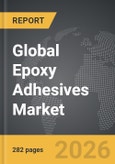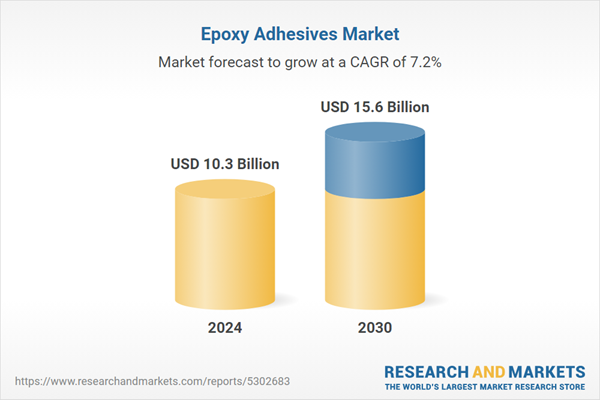Global Epoxy Adhesives Market - Key Trends & Drivers Summarized
Why Are Epoxy Adhesives Essential in Industrial and Structural Applications?
Epoxy adhesives are widely used in industrial, construction, and structural applications due to their excellent bonding strength, durability, and resistance to environmental stressors. These adhesives are formulated from epoxy resins and hardeners, which, when mixed, create a robust and long-lasting bond that withstands heat, chemicals, and physical stress. Epoxy adhesives are particularly valuable in industries such as automotive, aerospace, electronics, and construction, where reliable and high-strength bonding is critical. In automotive manufacturing, for instance, epoxy adhesives are used to bond dissimilar materials such as metal and plastic, contributing to lighter, more fuel-efficient vehicles without compromising structural integrity.In construction, epoxy adhesives are essential for structural bonding, anchoring, and reinforcement of concrete, steel, and other materials, enhancing the durability and safety of infrastructure. They are also commonly used in marine applications due to their moisture resistance and in electronics where they protect components from vibration, dust, and heat. As industries prioritize strong, reliable, and environmentally resistant bonding solutions, epoxy adhesives have become indispensable, supporting long-lasting product performance across a wide range of challenging environments.
How Are Technological Advancements Shaping the Epoxy Adhesives Market?
Technological advancements in epoxy adhesives are expanding their performance capabilities, versatility, and sustainability, making them more adaptable to specific industrial needs. One significant advancement is the development of high-temperature-resistant epoxy adhesives that maintain their bonding strength under extreme heat, which is crucial for aerospace, automotive, and electronics applications. These high-performance adhesives enable secure bonds in environments where high heat, mechanical stress, or chemical exposure is prevalent.The focus on sustainability has led to innovations in bio-based epoxy adhesives, which reduce reliance on petroleum-based resins. These eco-friendly formulations, made from renewable resources, address environmental concerns and align with industry demands for greener solutions. Advances in fast-curing epoxy adhesives are also streamlining production processes by reducing curing times without compromising bond strength, improving efficiency, and enabling faster assembly in manufacturing. Nanotechnology is also enhancing epoxy adhesives, with nano-reinforcements improving strength, flexibility, and thermal and electrical conductivity. These advancements are making epoxy adhesives more specialized, versatile, and environmentally friendly, expanding their applications and supporting innovation across industries.
What Are the Key Applications of Epoxy Adhesives?
Epoxy adhesives are widely applied in industries that require high-strength, durable bonds capable of withstanding harsh conditions. In the automotive sector, epoxy adhesives are used in body assembly, sealing, and bonding components like doors, roofs, and panels, helping manufacturers reduce vehicle weight and improve fuel efficiency. The aerospace industry relies on epoxy adhesives for bonding composites and metals in aircraft structures, where durability and resistance to extreme temperatures and stress are essential for safety and performance.In the construction industry, epoxy adhesives are used for structural repairs, concrete bonding, and reinforcing weakened structures, contributing to the longevity and resilience of buildings, bridges, and infrastructure. Electronics manufacturing uses epoxy adhesives for securing and protecting components like circuit boards, providing electrical insulation and vibration resistance, essential for sensitive equipment. Marine and oil and gas sectors also rely on epoxy adhesives for bonding and repairing materials exposed to moisture and corrosive environments. These applications highlight the versatility and strength of epoxy adhesives in supporting high-performance requirements across diverse sectors.
What Is Driving Growth in the Epoxy Adhesives Market?
The growth in the epoxy adhesives market is driven by increasing demand for high-performance bonding solutions, advancements in technology, and the expansion of industries like automotive, aerospace, and construction. The automotive industry's shift toward lightweight materials and electric vehicles is increasing demand for epoxy adhesives, as they offer a reliable solution for bonding dissimilar materials and reducing vehicle weight. Aerospace and defense sectors also rely heavily on epoxy adhesives for bonding lightweight composites, which are essential for improving fuel efficiency and reducing emissions.Advancements in technology, such as fast-curing formulations and high-temperature-resistant adhesives, are expanding the range of applications, making epoxy adhesives more suitable for high-performance environments. The construction industry's growth, particularly in emerging economies, is boosting demand for epoxy adhesives, which play a crucial role in infrastructure projects that require durable, long-lasting bonds. Additionally, the trend toward sustainable products is driving the development of bio-based epoxy adhesives, aligning with regulatory standards and meeting consumer expectations for environmentally friendly materials.
Together, these factors - demand for lightweight and high-performance materials, technological advancements, expansion of key industries, and sustainability - are driving significant growth in the epoxy adhesives market. Epoxy adhesives have become an essential tool in modern manufacturing and construction, providing durable, reliable, and versatile bonding solutions for critical applications across multiple industries.
Report Scope
The report analyzes the Epoxy Adhesives market, presented in terms of market value (US$ Thousand). The analysis covers the key segments and geographic regions outlined below.- Segments: Type (One-Component, Two-Component, Other Types); End-Use (Construction, Automotive, Aerospace & Defense, Electrical & Electronics, Marine, Energy & Power, Other End-Uses).
- Geographic Regions/Countries:World; United States; Canada; Japan; China; Europe (France; Germany; Italy; United Kingdom; Spain; Russia; and Rest of Europe); Asia-Pacific (Australia; India; South Korea; and Rest of Asia-Pacific); Latin America (Argentina; Brazil; Mexico; and Rest of Latin America); Middle East (Iran; Israel; Saudi Arabia; United Arab Emirates; and Rest of Middle East); and Africa.
Key Insights:
- Market Growth: Understand the significant growth trajectory of the One-Component Epoxy Adhesives segment, which is expected to reach US$6.7 Billion by 2030 with a CAGR of a 7.9%. The Two-Component Epoxy Adhesives segment is also set to grow at 6.9% CAGR over the analysis period.
- Regional Analysis: Gain insights into the U.S. market, valued at $2.6 Billion in 2024, and China, forecasted to grow at an impressive 10.9% CAGR to reach $3.8 Billion by 2030. Discover growth trends in other key regions, including Japan, Canada, Germany, and the Asia-Pacific.
Why You Should Buy This Report:
- Detailed Market Analysis: Access a thorough analysis of the Global Epoxy Adhesives Market, covering all major geographic regions and market segments.
- Competitive Insights: Get an overview of the competitive landscape, including the market presence of major players across different geographies.
- Future Trends and Drivers: Understand the key trends and drivers shaping the future of the Global Epoxy Adhesives Market.
- Actionable Insights: Benefit from actionable insights that can help you identify new revenue opportunities and make strategic business decisions.
Key Questions Answered:
- How is the Global Epoxy Adhesives Market expected to evolve by 2030?
- What are the main drivers and restraints affecting the market?
- Which market segments will grow the most over the forecast period?
- How will market shares for different regions and segments change by 2030?
- Who are the leading players in the market, and what are their prospects?
Report Features:
- Comprehensive Market Data: Independent analysis of annual sales and market forecasts in US$ Million from 2024 to 2030.
- In-Depth Regional Analysis: Detailed insights into key markets, including the U.S., China, Japan, Canada, Europe, Asia-Pacific, Latin America, Middle East, and Africa.
- Company Profiles: Coverage of players such as 3M Company, Ashland Inc., Delo Industrie Klebstoffe GmbH & Co. KGaA, DuPont, H.B. Fuller and more.
- Complimentary Updates: Receive free report updates for one year to keep you informed of the latest market developments.
Some of the 33 companies featured in this Epoxy Adhesives market report include:
- 3M Company
- Ashland Inc.
- Delo Industrie Klebstoffe GmbH & Co. KGaA
- DuPont
- H.B. Fuller
- Henkel AG
- Hernon Manufacturing Inc.
- Hubei Huitian New Materials Co., Ltd.
- Huntsman Corporation
- Illinois Tool Works Incorporation
- Lord Corporation
- Mapei S.P.A.
- Masterbond Inc.
- Panacol-Elosol GmbH
- Parson Adhesives Inc.
- Permabond LLC.
- RPM International Inc.
- Sika AG
- Uniseal, Inc.
- Weicon GmbH & Co. KG
This edition integrates the latest global trade and economic shifts into comprehensive market analysis. Key updates include:
- Tariff and Trade Impact: Insights into global tariff negotiations across 180+ countries, with analysis of supply chain turbulence, sourcing disruptions, and geographic realignment. Special focus on 2025 as a pivotal year for trade tensions, including updated perspectives on the Trump-era tariffs.
- Adjusted Forecasts and Analytics: Revised global and regional market forecasts through 2030, incorporating tariff effects, economic uncertainty, and structural changes in globalization. Includes historical analysis from 2015 to 2023.
- Strategic Market Dynamics: Evaluation of revised market prospects, regional outlooks, and key economic indicators such as population and urbanization trends.
- Innovation & Technology Trends: Latest developments in product and process innovation, emerging technologies, and key industry drivers shaping the competitive landscape.
- Competitive Intelligence: Updated global market share estimates for 2025, competitive positioning of major players (Strong/Active/Niche/Trivial), and refined focus on leading global brands and core players.
- Expert Insight & Commentary: Strategic analysis from economists, trade experts, and domain specialists to contextualize market shifts and identify emerging opportunities.
Table of Contents
Companies Mentioned (Partial List)
A selection of companies mentioned in this report includes, but is not limited to:
- 3M Company
- Ashland Inc.
- Delo Industrie Klebstoffe GmbH & Co. KGaA
- DuPont
- H.B. Fuller
- Henkel AG
- Hernon Manufacturing Inc.
- Hubei Huitian New Materials Co., Ltd.
- Huntsman Corporation
- Illinois Tool Works Incorporation
- Lord Corporation
- Mapei S.P.A.
- Masterbond Inc.
- Panacol-Elosol GmbH
- Parson Adhesives Inc.
- Permabond LLC.
- RPM International Inc.
- Sika AG
- Uniseal, Inc.
- Weicon GmbH & Co. KG
Table Information
| Report Attribute | Details |
|---|---|
| No. of Pages | 282 |
| Published | February 2026 |
| Forecast Period | 2024 - 2030 |
| Estimated Market Value ( USD | $ 10.3 Billion |
| Forecasted Market Value ( USD | $ 15.6 Billion |
| Compound Annual Growth Rate | 7.2% |
| Regions Covered | Global |









